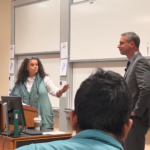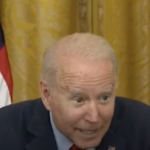Checks, Balances, And Checkbooks
This column is part of an ongoing series of essays examining and applying the timeless principles and truths of the Federalist Papers to the political events of our day.
“I don’t control the checkbook . . . I’m not the king of New Jersey. I’m just the governor.”– NJ Gov. Chris Christie
The recent Jersey Shore town hall meeting that many who are “Ready for Hillary” may have hoped would end Chris Christie’s threat to their champion took an unexpected turn in the direction of a primer on 21st century American federalism. More the lion tamer than the elephant in the room filled with 300 Garden Staters, Gov. Christie lamented that he had no control over federal purse strings. The real bully was the federal government, unwilling to return more than 61 cents on every dollar New Jersey residents send to Washington, D.C.
One wonders whether Christie ever imagined such a small return on the personal political investment he made when praising the Obama Administration’s declaration of superintendence over Hurricane Sandy relief a week before the 2012 presidential election. Then the President told Christie to call him if he needed anything. Sixteen months later, while President Obama is willing to use his phone and his pen to take on Republicans in Congress, he is apparently unwilling to return Christie’s calls or to help send his constituents checks.
A more careful student of politics and less careful politician might have seen this coming.
In 1987, the Supreme Court ruled that Congress could withhold a percentage of transportation funds from states that allowed drinking by those under 21 years of age; that is, that the Congress could attempt to do indirectly what it could not constitutionally do directly: establish a national drinking age. The federal government had long been understood to be able to attach qualifications to the spending of taxpayer dollars, like work requirements for welfare recipients. But, as Justice O’Connor noted in her dissent, this decision affirmed the government’s ability to use its spending power to make policy in areas only distantly related to the purpose of the spending: obviously, maintaining federal highways and deciding whether college students can drink are two different matters. Whatever the merits of the 7-2 ruling, however, the real story is that while only fifteen states had a drinking age of 21 before the law was passed (1984), all fifty had adopted that policy within a year of the court’s ruling.
This may not surprise us, given the degree to which the states depend on federal funds to fill the holes in their budgets. But it does illustrate well the consequences of such dependency for the independence of the states and the prospects of a state-level check against always-expanding federal authority today.
The theory of checks and balances so famously described in Federalist 51 and embedded as a central principle in the Constitution has both horizontal and vertical dimensions. We are much more familiar with the horizontal: the veto power the president can use to check congressional overreach, the impeachment power the Congress can use against the president, and the like. Each of these powers allows “ambition” to “counteract ambition”–providing the “constitutional means” to go with the assumed “motive” necessary to limit violations of the Constitution.
The ways that these horizontal checks have broken down is a subject for another essay (stay tuned!), but the same mutual ambition was expected to define the relationship between the federal government as a whole and the individual states, maintaining the delicate balance between the powers of the two.
As Paul David Miller recently noted in this same space, an essential element of that vertical check-and-balance system was lost with the ratification of the 17th Amendment, establishing the direct popular election of U.S. senators. Senators have too often become creatures of Washington, rather than representatives of their home state, as Senator Pat Roberts’s recent contortions to establish his Kansas residency bonafides amply demonstrate.
This change has made it more likely that the federal government would encroach on traditionally state ground and more difficult for the states to resist that encroachment. But the story of (especially recent) federal expansion can’t be told without acknowledging that too often most, if not all, states are content to cede power to the national government so long as money or some residual authority flows back in their direction.
Some deals, of course, are better than others. The Medicaid expansion that is a part of Obamacare pays 100% of state costs with federal dollars through 2016 before that figures begins to taper off to 90% by 2020. Since, however, the typical federal share of Medicaid spending is 57%, the states that sign on may find themselves holding the bag in a few years, when the federal deficit is expected to grow rapidly again and the terms of the original deal have expired.
But the deeper problem with the pattern of friendly negotiations that defines and redefines federal-state government relations today is that the negotiators act as if the people haven’t already defined the pattern for those relations in state and federal constitutions.
Alexander Hamilton didn’t miss this point. In Federalist 32, he defended the federal taxing power authorized by the Constitution, while showing it was compatible with a similar state power. He argued that federal authority would preempt state action in only three cases: (1) “where the Constitution in express terms granted an exclusive authority to the Union;” (2) “where it granted in one instance an authority to the Union, and in another prohibited the States from exercising the like authority,” and (3) “where it granted an authority to the Union, to which a similar authority in the States would be absolutely and totally contradictory and repugnant.” Since only a small number of items fell within these categories, the original balance of power between the states and federal government tilted heavily toward the states.
But what would maintain this balance? What would prevent an “entire consolidation of the States into one complete national sovereignty”? Anti-federalists read the Constitution’s “necessary and proper” clause (Article I, Section 8) and saw an opening for expansive federal power. They read the “supremacy clause” (Article VI) and saw a power to trump state laws or even constitutions. The Federalist as a whole provides several responses to these questions and concerns, but Hamilton’s answer at the beginning of Federalist 32 gives us an instructive glimpse into the sources of our present difficulties.
Even if, Hamilton supposes, there were no constitutional protections for the state power to tax, “the sense of the people, the extreme hazard of provoking the resentments of the State governments, and a conviction of the utility and necessity of local administrations for local purposes” would prevent the national government from usurping that authority.
Today, of course, it is neither the universal “sense of the people” nor conviction of our leaders that “local administrations for local peoples” are good and necessary. Central to Progressivism, in fact, is a strong presumption toward uniform national administration in all areas of policy. Yet the real laugher today in Hamilton’s argument, as Governor Christie’s town hall meeting demonstrated, is the idea that there would be an “extreme hazard in provoking the resentments of the State governments.”
Many in the mainstream media expected (and probably hoped) that Governor Christie’s town hall meeting would provide new fuel for the Traffic-Gate fire. Instead, it ironically showcased the power he didn’t have, much less abuse. As long as state governments continue to meet the federal government with their hands out rather than their (constitutional) fists up, even the baddest governor will play more the lamb than the lion in confronting the “great and radical vice” that has helped corrupt American federalism and bankrupt America.




